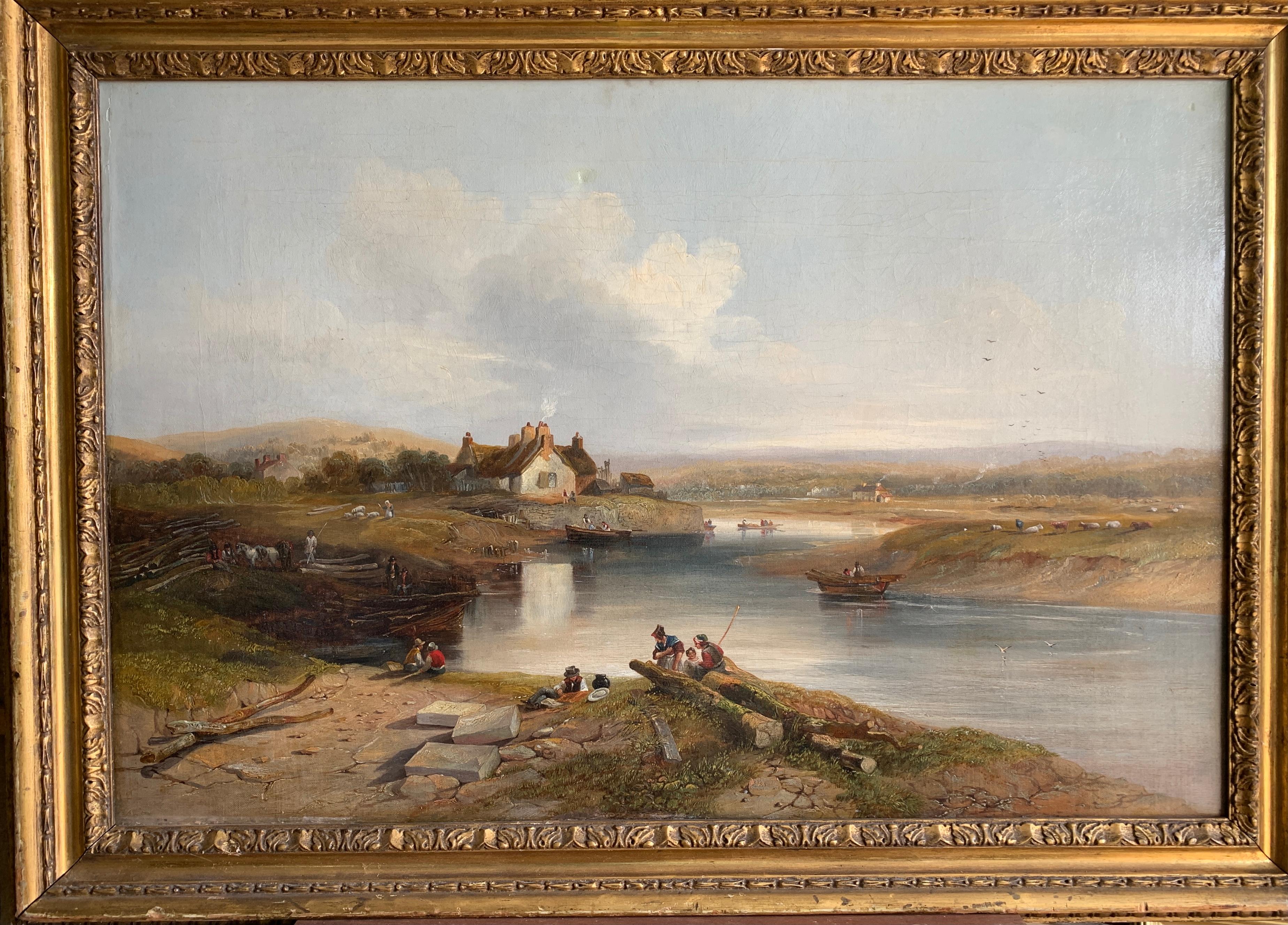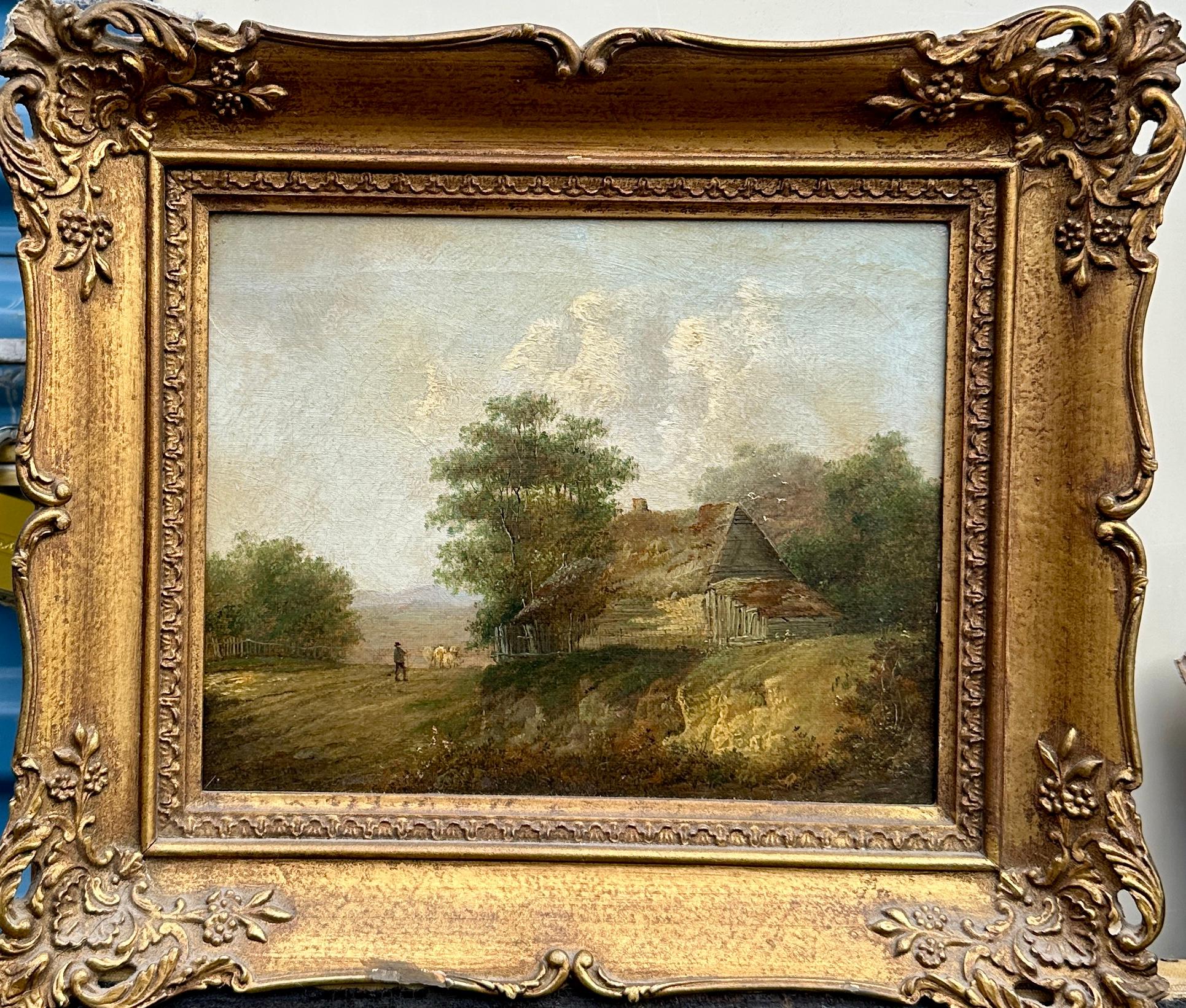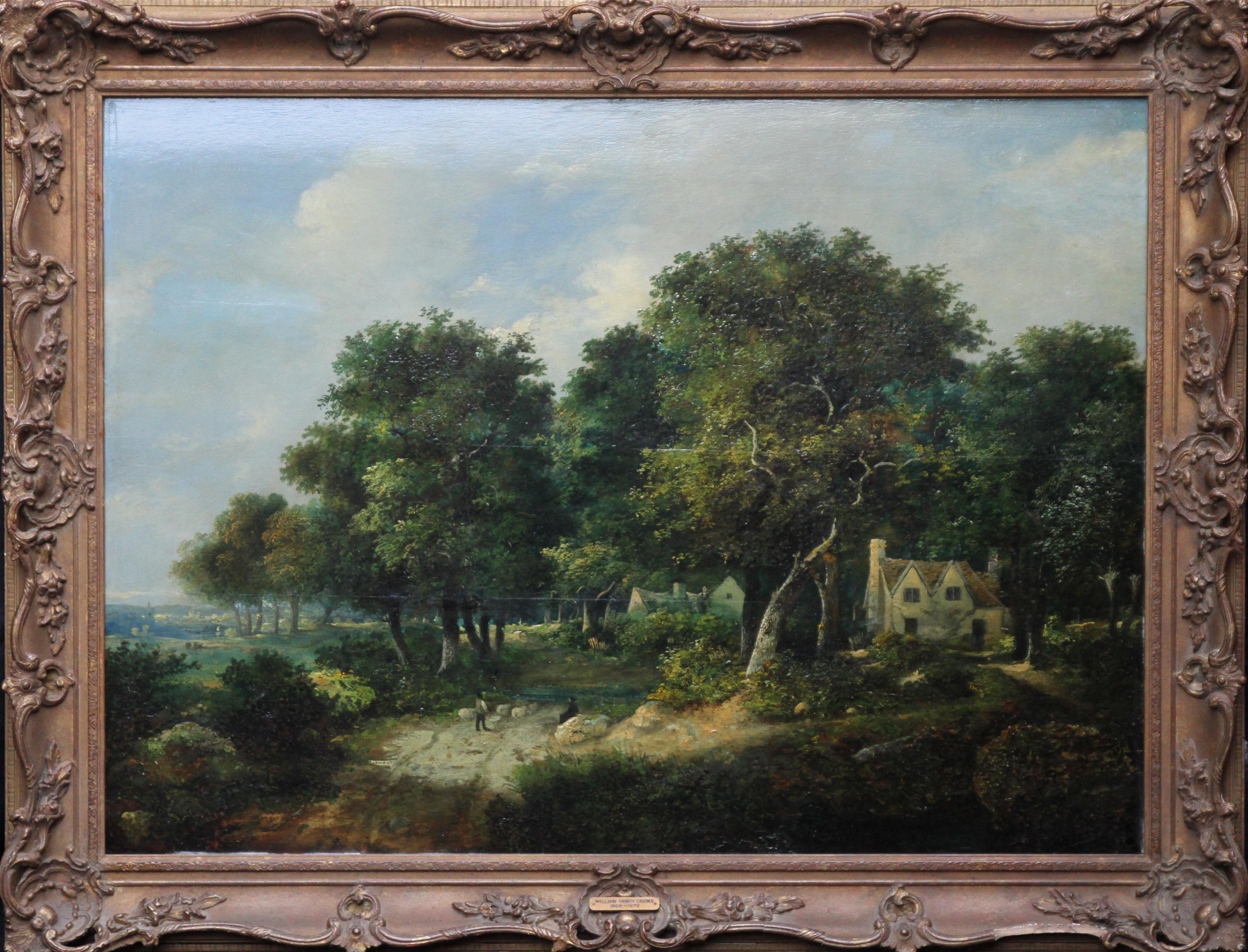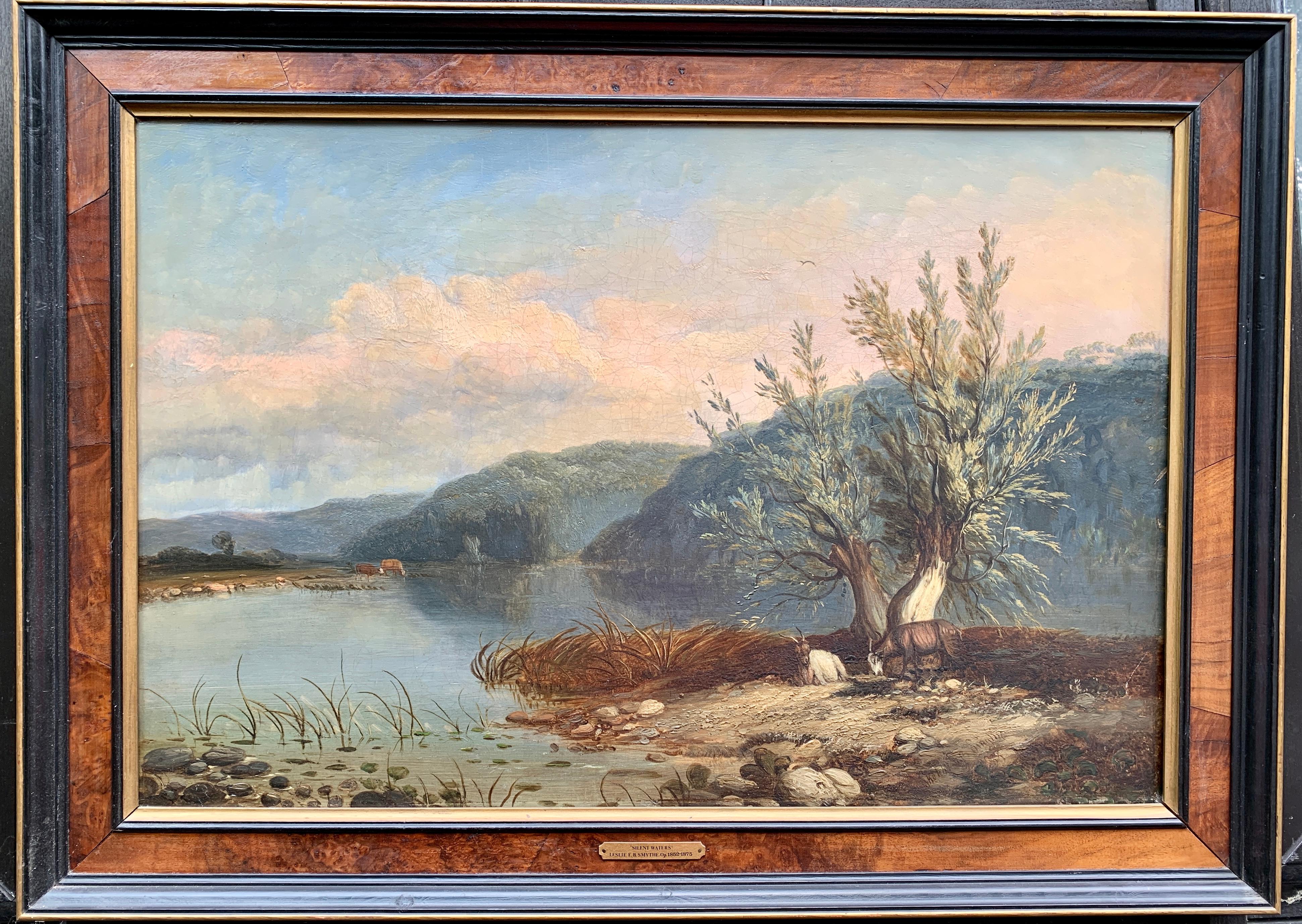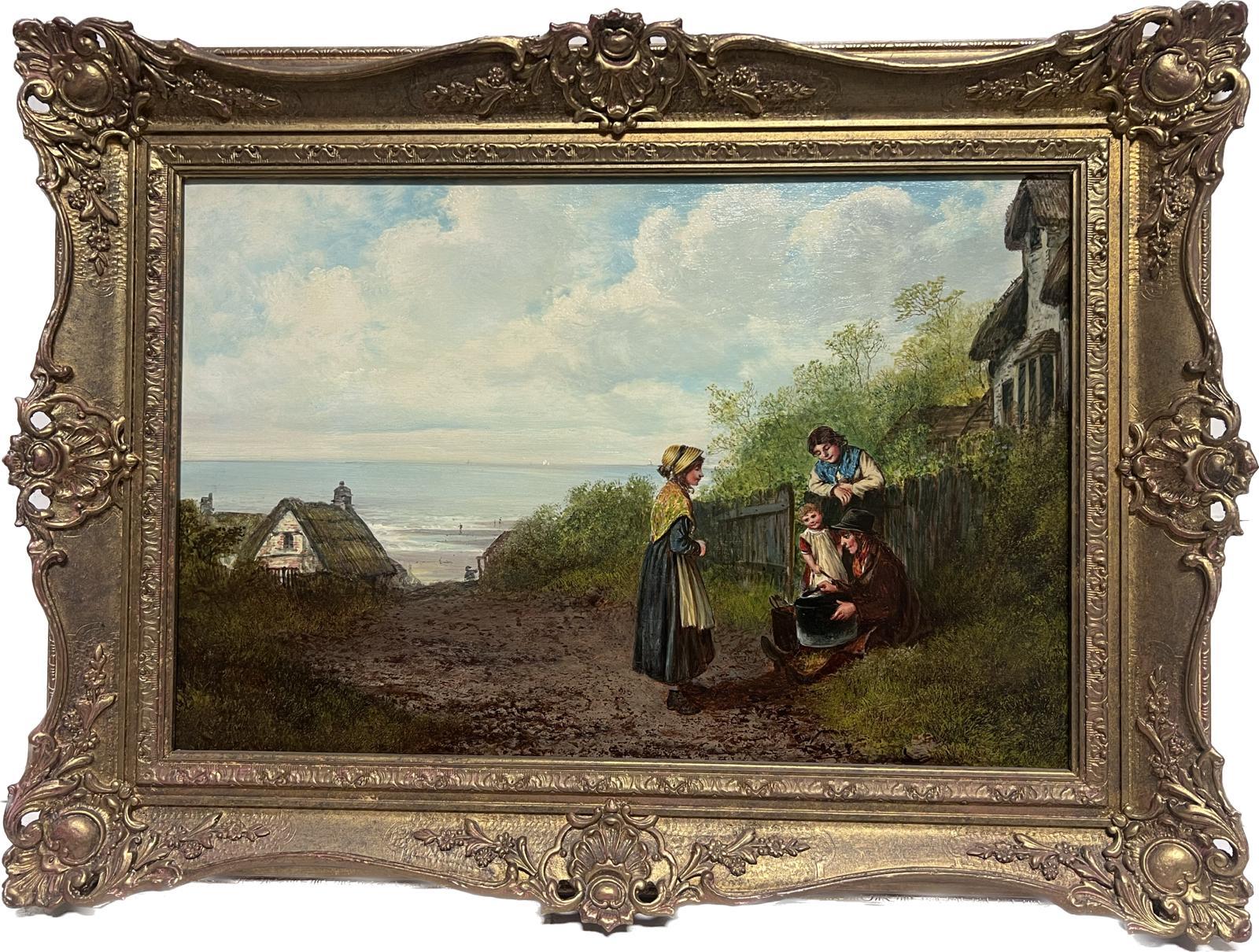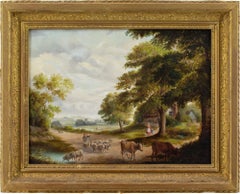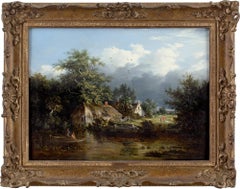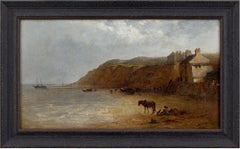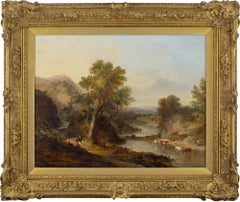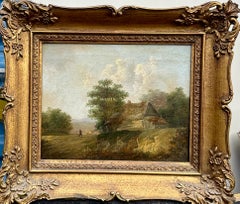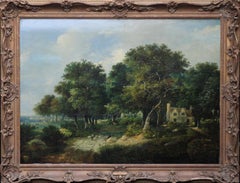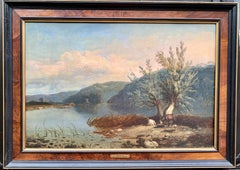Items Similar to Edward William Cooke RA, West-Country Cove With Cottages, Family & Donkeys
Video Loading
Want more images or videos?
Request additional images or videos from the seller
1 of 15
Edward William CookeEdward William Cooke RA, West-Country Cove With Cottages, Family & Donkeysc. 1875
c. 1875
$3,288.40
£2,400
€2,799.47
CA$4,504.29
A$5,009.75
CHF 2,615.94
MX$60,963.32
NOK 33,409.49
SEK 31,332.20
DKK 20,893.52
Shipping
Retrieving quote...The 1stDibs Promise:
Authenticity Guarantee,
Money-Back Guarantee,
24-Hour Cancellation
About the Item
This idyllic late 19th-century oil painting by English artist Edward William Cooke RA (1811-1880) depicts a west-country cove with two cottages, donkeys, figures, and fishing boats. Cooke was a highly renowned painter of marine scenes and landscapes who exhibited extensively at London’s Royal Academy.
From our elevated vantage point, the view extends between two quaint cottages and across the beach before sweeping around the sandy coastline. Crystalline waters lap the shore, where moored craft rest. It’s an accomplished rendering of a challenging composition. It’s enhanced by trees, which essentially ‘frame’ the right side, while a wooded track provides interest on the left.
Cooke was a keen admirer of the Dutch old masters, and the spirit of the Golden Age underpins this splendid work. In diaries, he recorded how he travelled by donkey to access elevated spots in the southwest, so it’s conceivable that he did so here. In his catalogue raisonné, it lists a work from the same year titled ‘Bay with Donkeys’.
Born in Pentonville, London, Cooke was raised in the company of accomplished artists as both his father, George Cooke (1781-1834), and his uncle, William Bernard Cooke (1778-1855), were engravers. As such, they were associated with a circle of Victorian painters who aided Cooke’s early development. These included the highly regarded marine painter Clarkson Frederick Stanfield RA RBA (1793-1867), who provided frequent advice and inspiration. Indeed, as a teenager, Cooke produced numerous drawings after Stanfield’s works.
A precocious talent, by the age of nine, he was already displaying an advanced understanding of engraving, particularly for ships, coupled with a natural, seemingly in-built skill as a draughtsman. Many of his early drawings depict pastoral landscapes after the masters, such as Nicolaes Berchem (1620-1683), Paulus Potter (1625-1654), and Karel Dujardin (1626-1678).
In an extraordinary turn of events, in 1820, his advanced abilities led to his first commission when he provided botanical illustrations for John Loudon's 'Encyclopaedia of Plants’. These were followed by drawings published in the 'Botanical Cabinet' by George Loddiges. He worked tirelessly at the nursery grounds in Hackney, producing hundreds of representations upon wood, followed by around 400 watercolours.
Despite this youthful foray into botanics, ships were Cooke’s true passion and ultimately led to him undertaking a period of study under Captain Burton of the West-Indiaman, ‘Thetis’. During his time with Burton, he filled sketchbooks with depictions of vessels in the London docks while also advancing his knowledge of oil painting.
From here, having navigated his training, his career evolved at pace, and he began to travel extensively. First to Normandy, Havre, and Rouen (1830), next to Belgium, Holland, France, Scotland, and Ireland (1832-1844) and then to Scandinavia, Spain, North Africa and Venice. Working predominently outside, from life, an astonishing array of vistas, weather conditions, and topography were met by his brush.
He first visited the Netherlands in 1837 and returned regularly over the next 23 years, with the 17th-century Dutch marine artists a particular inspiration. These travels served a dual purpose - informing his work while also enhancing his breadth of worldly knowledge. Indeed, Cooke was a great deal more than a painter, as one obiturist noted: “His scientific attainments were marked by his election as a Fellow of the Royal Society, a very rare honour for an artist, in addition to being a Member of the Geological, Linnean, and other learned societies, testifying to his refined tastes and scientific pursuits.”
His commitment to both art and science led to an array of plaudits, including his election to the academies at London, Stockholm and Venice. Over 120 of his works were shown at the Royal Academy in London.
In his later years, he settled in East Grinstead, Sussex, where he “lived the life of a quiet country gentleman in his beautifully situated house on a ridge of hills near Tunbridge Wells, on the confines of the counties of Kent and Sussex.”
He’s represented in numerous major public collections, including at the National Gallery, Tate Britain, the V&A, and the Royal Academy.
Signed/dated in the lower right and held in a later frame.
Provenance: With Arthur Tooth & Sons Ltd, London (1947) / Marine Pictures and Works of Art, Bonhams, London, 10 August 1989, lot 39 / Private collection, UK.
Exhibited: London, Tate, Sickert, Paintings and Drawings, May - June 1960, no. 72.
Artist’s auction maximum: £180,000 for ‘Bella Venezia (1860)’, Oil on canvas, Christie’s, Victorian & Traditionalist Pictures, London, 22 November 2006 (lot 289).
Our reference: BRV2131
- Creator:Edward William Cooke (1811 - 1890, British)
- Creation Year:c. 1875
- Dimensions:Height: 28.5 in (72.39 cm)Width: 36.5 in (92.71 cm)
- Medium:
- Movement & Style:
- Period:
- Condition:Cleaned. Revarnished. Faint stretcher mark. Areas of fine and settled craquelure, as you would expect. The paint layer is stable. Frame in good condition with minor age-related wear.
- Gallery Location:Cheltenham, GB
- Reference Number:1stDibs: LU2328216188792
About the Seller
5.0
Platinum Seller
Premium sellers with a 4.7+ rating and 24-hour response times
Established in 2017
1stDibs seller since 2023
240 sales on 1stDibs
Typical response time: 1 hour
- ShippingRetrieving quote...Shipping from: Cheltenham, United Kingdom
- Return Policy
Authenticity Guarantee
In the unlikely event there’s an issue with an item’s authenticity, contact us within 1 year for a full refund. DetailsMoney-Back Guarantee
If your item is not as described, is damaged in transit, or does not arrive, contact us within 7 days for a full refund. Details24-Hour Cancellation
You have a 24-hour grace period in which to reconsider your purchase, with no questions asked.Vetted Professional Sellers
Our world-class sellers must adhere to strict standards for service and quality, maintaining the integrity of our listings.Price-Match Guarantee
If you find that a seller listed the same item for a lower price elsewhere, we’ll match it.Trusted Global Delivery
Our best-in-class carrier network provides specialized shipping options worldwide, including custom delivery.More From This Seller
View AllMid-19th-Century English School, Rural Scene With Family, Cattle & Cottage
Located in Cheltenham, GB
This endlessly charming mid-19th-century English oil painting depicts a rural scene with a family, cattle, pond, and cottage.
A mother and child pause to observe a drover, perhaps f...
Category
1830s Landscape Paintings
Materials
Canvas, Oil
Edward Charles Williams (Attributed), Wooded River Landscape With Boathouse
By Edward Charles Williams
Located in Cheltenham, GB
This mid-19th-century oil painting, attributed to English artist Edward Charles Williams (1807-1881), depicts a wooded river landscape with a boathouse, cottage, fishermen and figure...
Category
1850s Victorian Landscape Paintings
Materials
Panel, Oil
Edward Robert Smythe, Figures & Horses On A Beach With Buildings
By Edward Robert Smythe
Located in Cheltenham, GB
This late 19th-century oil painting by English artist Edward Robert Smythe (1810-1899) depicts a picturesque bay with buildings, fishing boats, figures and horses. Smythe was a maste...
Category
1880s English School Landscape Paintings
Materials
Canvas, Oil
William Traies (Attributed), Wooded River Landscape With Cascade & Figures
Located in Cheltenham, GB
This charming mid-19th-century oil painting attributed to English artist William Traies (1789-1872) depicts a picturesque river view with cascade, figures and cattle. Traies was an a...
Category
1840s Victorian Landscape Paintings
Materials
Oil, Canvas
Thomas Sidney Cooper RA, Livestock In A Landscape With River Beyond
By Thomas Sidney Cooper
Located in Cheltenham, GB
This fine mid-19th-century oil painting by British artist Thomas Sidney Cooper RA (1803-1902) depicts two cows and a sheep in a landscape. Cooper was a distinguished painter of the n...
Category
1850s Victorian Animal Paintings
Materials
Oil, Canvas
Jacob Van Der Does II, Wooded River Landscape With Hunting Party & Village
Located in Cheltenham, GB
This extensive late 17th-century oil painting by Dutch artist Jacob van der Does II (1661-1699) depicts a river landscape with a hunting party, riverside buildings, various craft, a ...
Category
1680s Dutch School Landscape Paintings
Materials
Oil, Wood Panel
You May Also Like
19th century English River landscape with figures, horses, cottage, sheep
By John Frederick Tennant
Located in Woodbury, CT
Well painted and very interesting composition attributed to the English landscape painter john Frederick Tennant.
His work is very similar to ...
Category
1840s Victorian Landscape Paintings
Materials
Canvas, Oil
$2,760 Sale Price
20% Off
Free Shipping
19th century English landscape with Cottage
By Charles Morris
Located in Woodbury, CT
Charles Morris (British, active mid-19th century)
Rustic Landscape with Herdsman and Cottage, ca. 1860–1870
Oil on canvas
In this tranquil rural view, Charles Morris presents an idy...
Category
1870s Victorian Landscape Paintings
Materials
Canvas, Oil
Landscape with Cottages and Sheep - British Victorian 1850's art oil painting
By William Henry Crome
Located in London, GB
This superb oil on panel painting is by British Victorian artist William Henry Crome, son of artist John Crome, founder of the Norwich School. Painted circa 1850 the painting depicts...
Category
19th Century Victorian Landscape Paintings
Materials
Oil
19th century English rural landscapes, with goats by a river and people
Located in Woodbury, CT
LESLIE E.B. SMYTHE
19th century English rural landscapes, with goats by a river and people.
Smythe was an English painter who was active paintings in both Scotland and England. He ...
Category
1860s Victorian Landscape Paintings
Materials
Canvas, Oil
$3,960 Sale Price
20% Off
Free Shipping
19th Century Cornish/ Devon Fishing Cottages & Family Coastal Landscape Oil
By Victorian School
Located in Cirencester, Gloucestershire
The Fisherfolk
English School, 19th centurysigned oil on canvas, framed
framed: 17 x 23 inches
painting: 12 x 18 inches
provenance: private collection, England
condition: very good ...
Category
Late 19th Century Victorian Figurative Paintings
Materials
Oil, Canvas
19th century English coastal sea scene with warships, fishing boats and yachts
Located in Woodbury, CT
Alfred Vickers Senior (1786–1868)
Shipping off the Coast, oil on canvas, circa 1860, signed lower left
This lively coastal scene by Alfred Vickers Senior, painted circa 1860, reveal...
Category
1860s Victorian Landscape Paintings
Materials
Oil, Canvas
More Ways To Browse
Edward Mayer
Edward View
English Country Cottage
William Ireland
William Kent
Donkey Antique
Victorian Brush
Antique Oil Painting Ireland
English Gentleman Painting
Science Cabinet
Spanish Canvas 17th
Painting Scottish Irish
Arthur Hill
Antique Gentlemans Cabinet
Antique Dutch Display Cabinet
Antique Sketchbooks
George Waters
Tunbridge Wells
